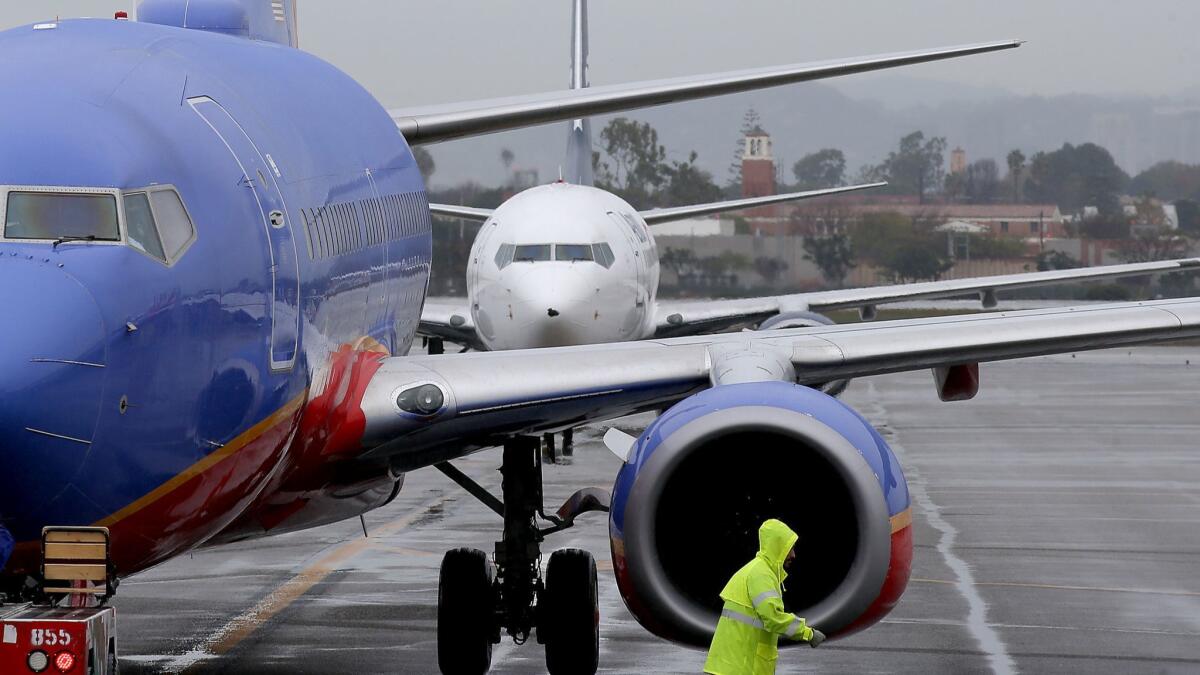Measles-infected person travels through LAX airport on Memorial Day weekend

- Share via
A traveler with measles passed through Los Angeles International Airport over the Memorial Day weekend, prompting officials to issue warnings for people who may have come close to the infected person.
The potential places where the public may have been exposed to the infectious traveler on May 26, the Sunday before Memorial Day, were at Terminal 4 and Gate 48B between 9:30 a.m. and 12:30 p.m., and the day after Memorial Day, May 28, at the Tom Bradley International Terminal. Potential exposure could have also occurred at a remote gate, between 3:30 p.m. and 5:30 p.m.
Anyone who may have been at those locations at those times may be at risk of developing measles for up to 21 days after being exposed to the virus, one of the most highly contagious in the world. According to the Los Angeles County Department of Public Health, anyone who might have traveled close to the infected person should:
- Review immunization and medical records if you aren’t sure if you’re protected against measles.
- Call a healthcare provider as soon as possible about a possible exposure for anyone pregnant, an infant, anyone who has a weakened immune system (such as cancer patients undergoing chemotherapy), or anyone who is not immunized.
- If illness with fever and/or an unexplained rash occurs between seven and 21 days after exposure, stay at home and call a health provider immediately. Entering a hospital or clinic while being infectious without calling first can put others in the facility at risk.
Health officials say there have been at least eight measles cases among L.A. County residents so far this year, and seven cases among travelers who live outside of the county. Most of the people who fell ill with the disease were not vaccinated.
Across California, there have been at least 51 confirmed measles cases so far this year, including 33 associated with outbreaks.
Gov. Newsom criticized the new vaccine bill. Anti-vaccine activists are celebrating »
Measles outbreaks have been much worse in other parts of the nation. There have been at least 981 cases of measles so far in 2019, which the U.S. Centers for Disease Control and Prevention says is the largest number since 1992.
Outbreaks in New York City and the nearby county of Rockland have persisted for nearly eight months; besides the California counties of Los Angeles, Sacramento and Butte, measles outbreaks are also ongoing in the states of New York, Michigan, Georgia, Maryland, Pennsylvania and Washington.
CDC officials on Thursday warned that the United States may be losing the fight against measles it won in 2000, when authorities declared that continuous domestic transmission of the disease had ended.
“That loss would be a huge blow for the nation and erase the hard work done by all levels of public health,” the CDC said in a statement. Before the vaccine, about 3 million to 4 million a year were infected by the virus nationwide, and resulted in 400 to 500 deaths annually.
Lawmakers in some states are responding to the outbreaks by considering strengthening laws for children to be vaccinated as a condition of entering classrooms, leaving homeschooling the main alternative for parents who don’t want their children inoculated because of their personal beliefs.
Public health advocates worry that some doctors are issuing bogus medical exemptions, allowing kindergartners to avoid inoculations for spurious reasons like asthma or skin conditions such as psoriasis.
In 2018, Dr. Bob Sears, an author and Orange County pediatrician well known for being sympathetic to parents opposed to vaccines, was punished by the Medical Board of California after he was accused by officials of wrongly writing a doctor’s note for a 2-year-old boy that exempted him from vaccinations without having obtained even basic medical information. Sears agreed to settle his case, which avoided a trial; he has also denied any wrongdoing.
Under Senate Bill 276 by state Sen. Richard Pan (D-Sacramento), the California Department of Public Health would decide whether the underlying condition cited by a doctor in a medical exemption meets criteria set by the CDC.
Gov. Gavin Newsom recently suggested he didn’t agree with the bill, saying “I don’t want someone that the governor of California appointed to make a decision for my family.” He did not say explicitly say whether he opposed or supported the bill.
More to Read
Sign up for Essential California
The most important California stories and recommendations in your inbox every morning.
You may occasionally receive promotional content from the Los Angeles Times.














